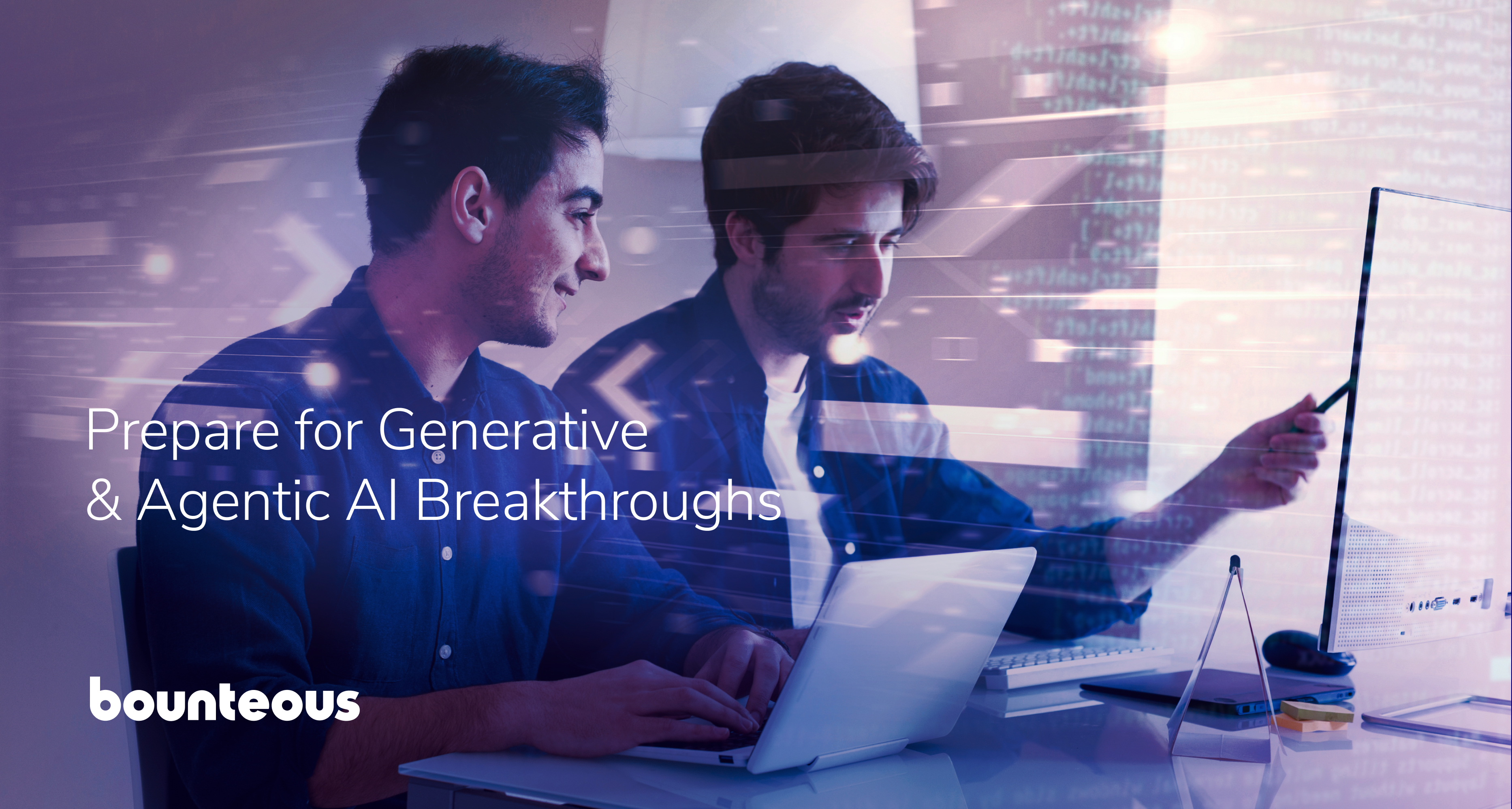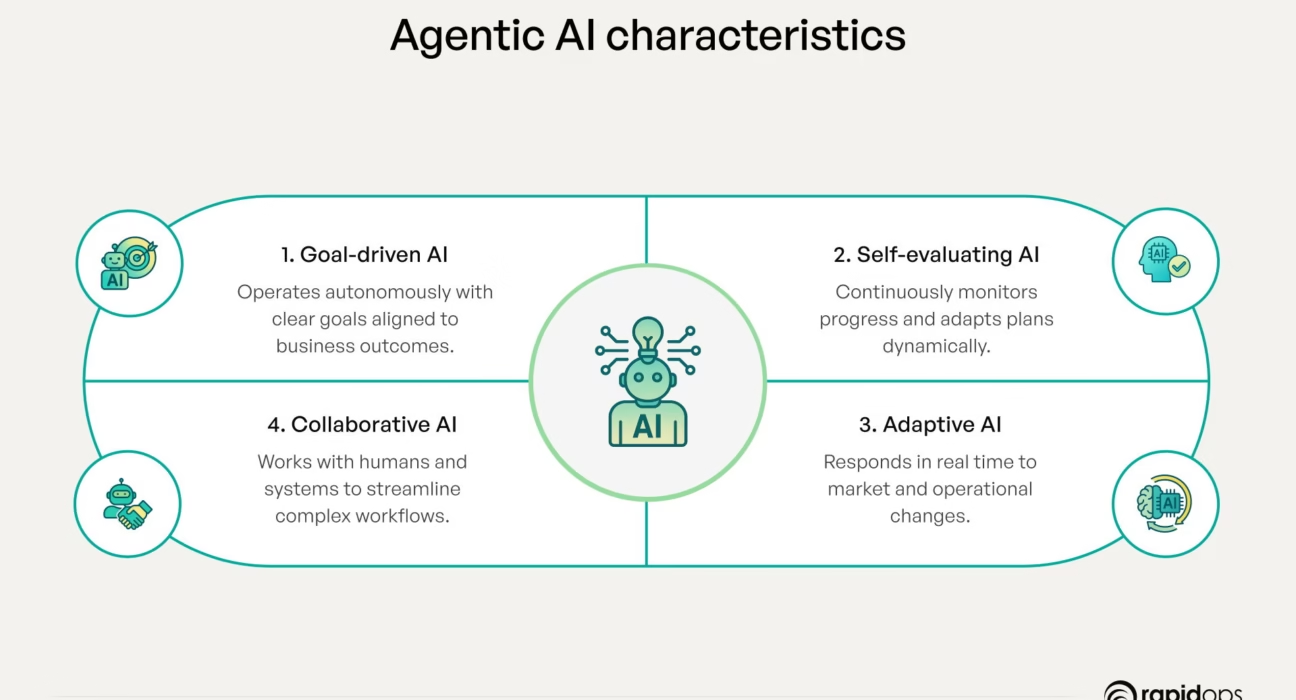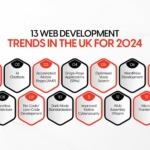Agentic AI: Revolutionizing Business Workflows and Beyond
Estimated reading time: 10 minutes
Key Takeaways
- Agentic AI refers to AI systems that act as autonomous agents, capable of planning, learning, and making decisions independently to achieve goals in dynamic environments.
- These systems are enabling significant agentic AI breakthroughs in business workflows by automating complex, cross-functional tasks previously requiring human intervention.
- Agentic AI enhances productivity, improves decision-making accuracy, and transforms various sectors including software development, enterprise operations, and scientific discovery.
- The evolution of AI agents transforming business is moving from simple task automation to sophisticated, orchestrated problem-solving.
- While powerful, agentic AI presents challenges related to ethics, implementation, and the continued need for human oversight.
Table of contents
- Agentic AI: Revolutionizing Business Workflows and Beyond
- Key Takeaways
- Understanding Agentic AI: The Core Concepts
- Agentic AI Breakthroughs in Business Workflows: The Transformative Impact
- Agentic AI Transforming Software Development: A New Era of Coding
- The Impact of Agentic AI on Enterprise Operations: Driving Efficiency and Agility
- Advancements in Agentic AI for Scientific Discovery: Accelerating Innovation
- The Evolution of AI Agents Transforming Business: From Simple Bots to Intelligent Systems
- Navigating the Challenges and Considerations of Agentic AI
- Frequently Asked Questions
The landscape of artificial intelligence is shifting at an unprecedented pace, with systems becoming increasingly sophisticated and, crucially, more autonomous. We are entering an era where AI is not just a tool but an active participant, capable of independent action. At the heart of this transformation is what we call agentic AI. This refers to artificial intelligence systems engineered to act as autonomous agents, capable of independently planning, learning, making context-aware decisions, and pursuing goals across dynamic environments.
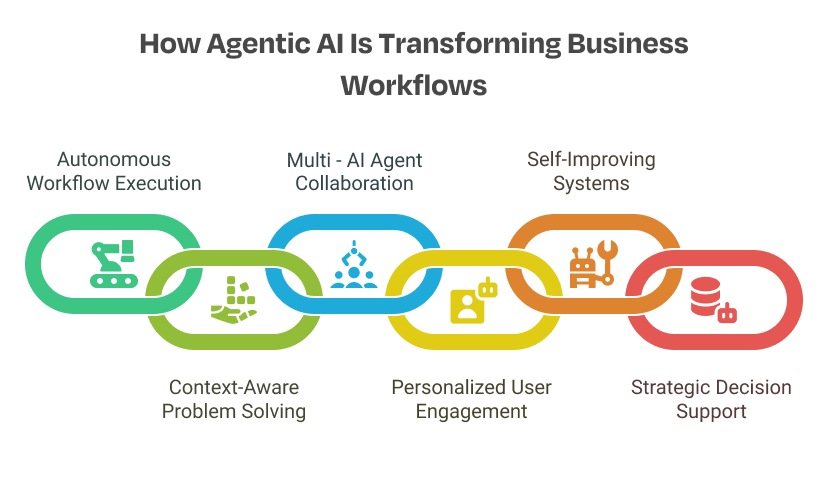
The emergence of agentic AI breakthroughs in business workflows are fundamentally transforming how businesses operate. These autonomous, goal-driven agents are now capable of executing complex, multifaceted operations that were previously reliant on extensive human intervention. This autonomous, goal-driven nature is a key differentiator from traditional automation or reactive AI. As noted by industry experts, agentic AI represents a significant leap forward, distinguishing itself from earlier AI paradigms.
This post will explore the profound impact of agentic AI across various domains, including business workflows, software development, enterprise operations, and scientific discovery, highlighting the critical theme of the evolution of AI agents transforming business. Our goal is to provide an informative overview of agentic AI’s capabilities and its profound impact on modern businesses and technological advancements.
Understanding Agentic AI: The Core Concepts
To truly grasp the significance of agentic AI, it’s essential to understand its fundamental characteristics. These agents are defined by a set of core capabilities that empower them to operate with a degree of independence and intelligence far beyond traditional AI tools.
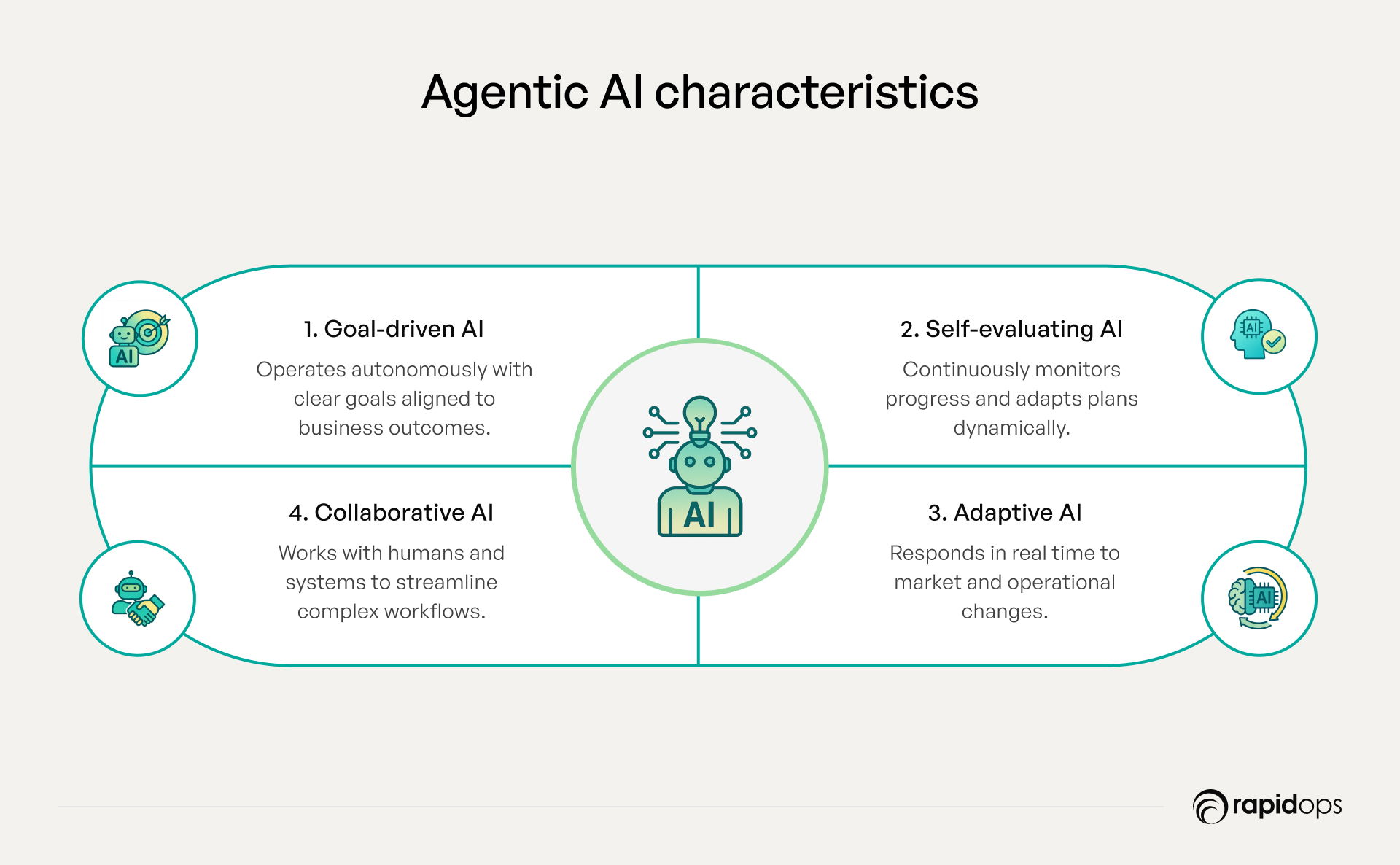
- Autonomy: Perhaps the most defining characteristic, agentic AI agents operate with minimal human oversight. They can initiate actions based on their understanding of the environment and their defined objectives, rather than waiting for explicit commands for every step.
- Learning: These agents are not static. They continuously learn from new data, their experiences, and feedback loops to improve their performance, refine their decision-making processes, and adapt to changing circumstances over time.
- Decision-Making: Agentic AI possesses sophisticated reasoning capabilities. They can analyze complex situations, consider context, weigh different options, and make informed decisions in dynamic and often unpredictable environments.
- Goal-Directed Behavior: At their core, agentic AI agents are programmed with specific objectives. They are proactive in working towards achieving these goals, orchestrating a series of actions and adapting their strategy as needed to reach the desired outcome.
These agents often leverage advanced technologies, including large language models (LLMs), sophisticated orchestration engines, and robust contextual memory systems. This combination allows them to effectively analyze information, adapt their strategies, and act across various interconnected systems.
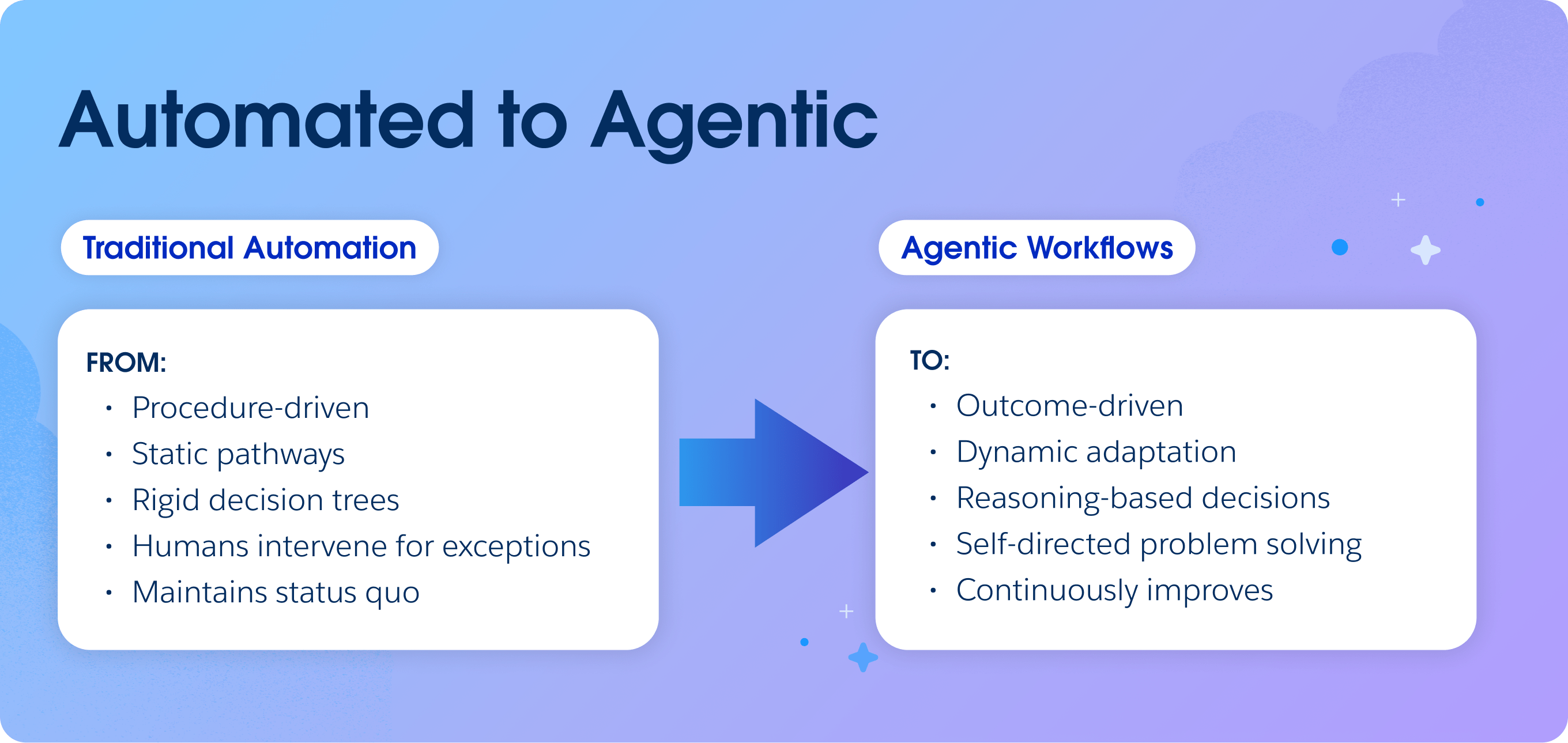
It’s crucial to differentiate agentic AI from traditional AI tools or simpler automated systems. Unlike traditional AI tools or basic “copilots” which typically automate isolated tasks or require frequent human input and supervision, agentic AI proactively orchestrates entire processes. They can collaborate with other agents, dynamically adapt to evolving scenarios, and manage complex workflows end-to-end. This move from task-specific automation to process orchestration marks a significant leap in AI’s practical application.
Agentic AI Breakthroughs in Business Workflows: The Transformative Impact
The advent of agentic AI is directly translating into substantial agentic AI breakthroughs in business workflows. These intelligent systems are no longer confined to niche applications; they are beginning to fundamentally alter how businesses operate across a multitude of functions.
Automating Complex, Cross-Functional Tasks: One of the most significant impacts is the ability of agentic AI to automate operations that span multiple departments and software systems. Imagine insurance claims processing, where an agent can independently gather information from various sources, assess validity, and initiate payouts, or complex customer support tickets that are triaged, diagnosed, and resolved by an AI agent reasoning across diverse tools and datasets without manual intervention. Similarly, intricate supply chain logistics, involving coordination between suppliers, manufacturers, and distributors, can now be managed and optimized autonomously. These are concrete examples of agentic AI breakthroughs in business workflows that were once the domain of human teams.

Enhancing Productivity and Efficiency: Agentic AI excels at taking on time-consuming, repetitive, and often tedious tasks. This can include everything from routine data entry and compliance checks to initial customer query handling. By offloading these responsibilities to AI agents, human employees are freed up to concentrate on higher-value, strategic initiatives that require creativity, critical thinking, and human empathy. This reallocation of human capital significantly boosts overall productivity and fosters a more innovative work environment. These agentic AI breakthroughs in business workflows are not about replacing humans but augmenting their capabilities.
Improving Decision-Making Accuracy and Consistency: By synthesizing vast amounts of historical and real-time data, agentic AI can inform business decisions with a level of depth and speed that is humanly impossible. This leads to reduced errors and greater consistency in outcomes. Areas like financial analysis, where precise data interpretation is critical, and fraud detection, where subtle anomalies must be identified quickly, are particularly benefiting from this enhanced decision-making. The ability of agentic AI to process and understand complex data streams contributes significantly to agentic AI breakthroughs in business workflows by providing more reliable insights.
Illustrative Examples of Workflow Automation:
- Customer Service: Agentic AI can provide 24/7 contextual support, personalize interactions based on customer history and needs, and handle a significant portion of customer issues, from simple inquiries to complex problem-solving, without needing human escalation. This dramatically improves customer satisfaction and operational efficiency.
- Supply Chain: AI agents can continuously monitor and optimize logistics in real-time, proactively identifying potential delays, rerouting shipments, and dynamically responding to unforeseen disruptions like weather events or geopolitical issues, thereby minimizing costs and ensuring timely delivery.
- Financial Analysis: Agentic AI systems can automate risk assessment for loans and investments, perform real-time transaction monitoring for suspicious activity, and detect anomalies that might indicate fraud, all with greater speed and accuracy than manual methods.
- Personalized Marketing: By performing deep analysis of user data, browsing behavior, and purchase history, agentic AI can tailor marketing campaigns with exceptional precision, delivering the right message to the right customer at the right time, thereby increasing engagement and conversion rates.
Agentic AI Transforming Software Development: A New Era of Coding
The software development lifecycle, traditionally a human-intensive process, is now experiencing a profound shift due to agentic AI. The concept of agentic AI transforming software development is not a distant future scenario; it’s a present reality that is accelerating innovation and improving code quality.
Code Generation and Automated Testing: Agentic AI agents are capable of autonomously writing code based on high-level specifications. Beyond mere generation, they can also review their own code, identify and fix bugs, and conduct comprehensive testing. This capability significantly accelerates development cycles, as agents can work continuously and efficiently. By catching bugs earlier in the process, agentic AI helps to improve overall code quality and reduce the technical debt associated with complex projects. This is a prime example of agentic AI transforming software development by streamlining the core coding process.
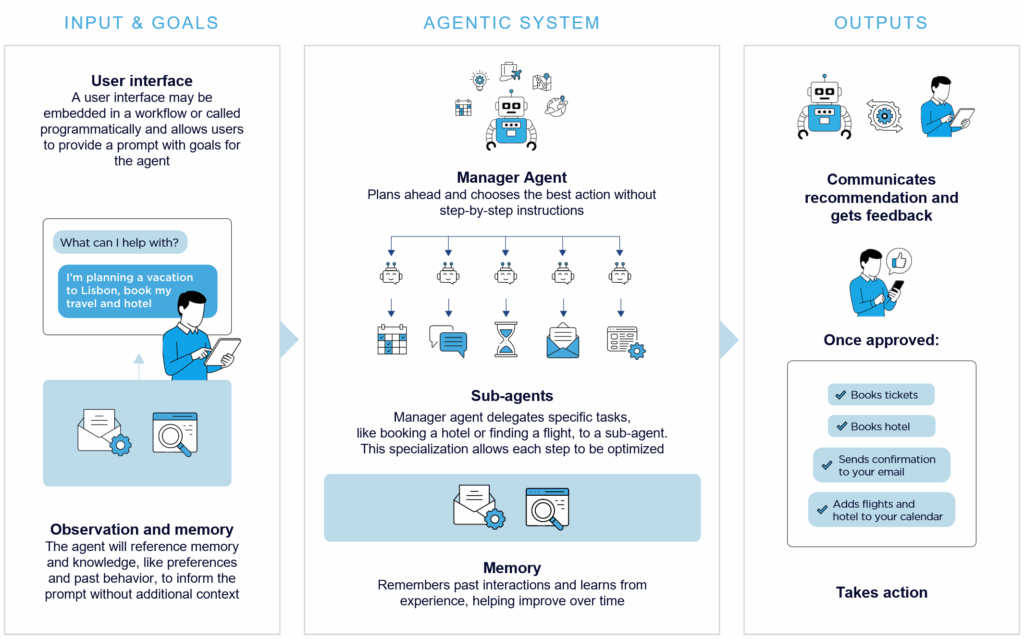
Automated Project Management: The complexities of software development projects, especially those involving large teams or intricate dependencies, can now be managed more effectively by AI agents. These agents can monitor project progress in real-time, track dependencies, allocate resources efficiently, and proactively flag potential bottlenecks or deviations from the planned schedule. This automated project management capability ensures that development teams can stay on track and respond quickly to any issues that arise, contributing to the overall effectiveness of agentic AI transforming software development.
Enhanced Team Collaboration: Agentic AI can serve as a force multiplier for development teams, even those that are geographically distributed. AI agents can automate the documentation of code changes, ensuring that all team members have access to up-to-date information. They can also coordinate feedback loops, facilitate code reviews, and ensure that communication channels remain open and efficient. By managing these collaborative aspects, agentic AI truly embodies the spirit of agentic AI transforming software development, creating a more cohesive and productive team environment.
The Impact of Agentic AI on Enterprise Operations: Driving Efficiency and Agility
For large enterprises, the adoption of agentic AI promises to unlock new levels of operational efficiency and agility. The impact of agentic AI on enterprise operations is far-reaching, touching everything from day-to-day tasks to strategic resource allocation.
Streamlined Operational Efficiency: Agentic AI can automate end-to-end business processes, effectively eliminating manual bottlenecks that often plague large organizations. By seamlessly orchestrating tasks across different departments and systems, agentic AI reduces operational costs, minimizes errors, and improves overall throughput. Processes that once took days or weeks can be completed in hours or minutes, leading to significant gains in efficiency and responsiveness.
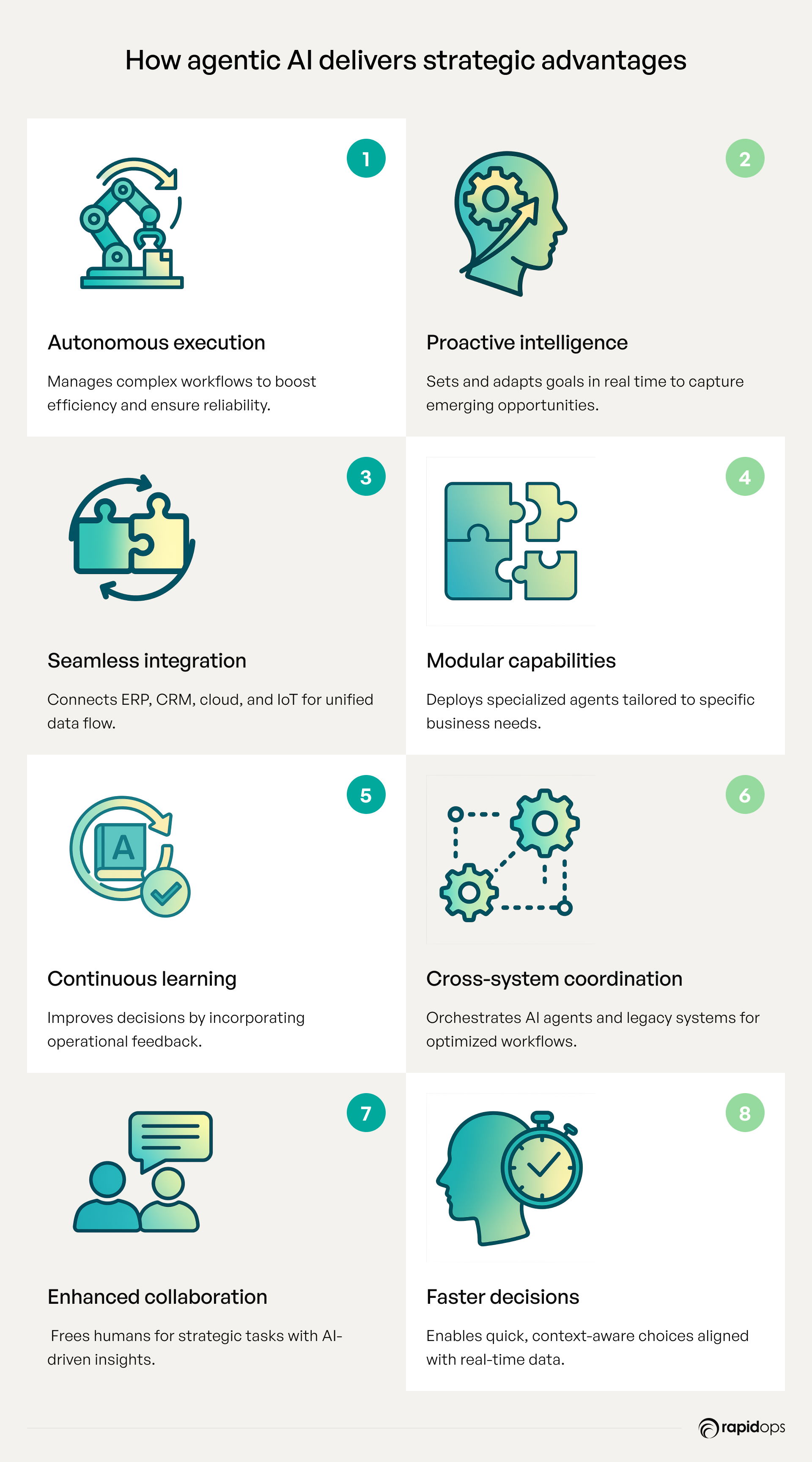
Optimized Resource Management: Intelligent agents can dynamically allocate both human and material resources with remarkable precision. This means ensuring that the right personnel with the right skills are assigned to tasks, that equipment is utilized optimally, and that inventory levels are maintained efficiently. The result is increased utilization, reduced waste, and a more controlled and optimized spending across the enterprise.
Proactive Risk Mitigation: In complex enterprise environments, potential risks can emerge from various sources. Agentic AI systems can continuously monitor operational data, identify anomalies, and detect potential risks across the organization. This proactive approach allows for early intervention before issues escalate into major problems, significantly enhancing security, compliance, and overall operational stability.
Enhanced Scalability and Agility: The business world is constantly changing, and enterprises need to be able to adapt quickly. Agentic AI empowers organizations to scale their operations rapidly in response to fluctuating market demands or unforeseen disruptions. Whether it’s handling a surge in customer orders or adapting to new regulatory requirements, agentic AI enables businesses to do so with greater agility and minimal disruption, ensuring they remain competitive in a dynamic environment.
Advancements in Agentic AI for Scientific Discovery: Accelerating Innovation
Beyond the commercial realm, agentic AI is also making significant strides in accelerating the pace of scientific discovery. The advancements in agentic AI for scientific discovery are opening up new frontiers in research and development.
Expedited Research Cycles: Scientific research is often characterized by long, laborious processes. Agentic AI can significantly expedite these cycles by autonomously handling tasks such as experiment design, complex data analysis, and the generation of research reports. AI agents can operate continuously, without fatigue, performing repetitive or data-intensive tasks at speeds unattainable by human researchers alone. This accelerates the overall research timeline, bringing potential breakthroughs closer.

Intelligent Data Analysis and Hypothesis Generation: The sheer volume and complexity of scientific data can be overwhelming. Agentic AI excels at mining these vast and intricate datasets to uncover hidden patterns, identify subtle correlations, and even formulate novel scientific hypotheses. By providing researchers with these AI-generated insights, agentic AI significantly shortens the time from data collection to the formulation of testable theories and potential discoveries.
Key Application Areas: The impact of agentic AI is particularly pronounced in fields like drug discovery, where AI agents can automate the screening of millions of chemical compounds, predict molecular interactions, and optimize drug candidates. In material science, agentic AI can accelerate the discovery of new materials with desired properties through sophisticated simulations and analysis, pushing the boundaries of what is possible.
The Evolution of AI Agents Transforming Business: From Simple Bots to Intelligent Systems
To fully appreciate the current state and future potential of agentic AI, it’s helpful to consider its evolutionary trajectory. The evolution of AI agents transforming business represents a move from basic automation to truly intelligent, adaptive systems.
Historical Trajectory: In the past, automation in business primarily involved rule-based systems and narrow AI, designed to perform specific, repetitive tasks. These systems lacked the ability to learn, adapt, or make complex decisions. More recently, we’ve seen the rise of sophisticated multi-agent systems. These systems are capable of more holistic, orchestrated problem-solving, exhibiting dynamic reasoning and a greater understanding of context. This progression has been driven by advancements in machine learning, computational power, and data availability.
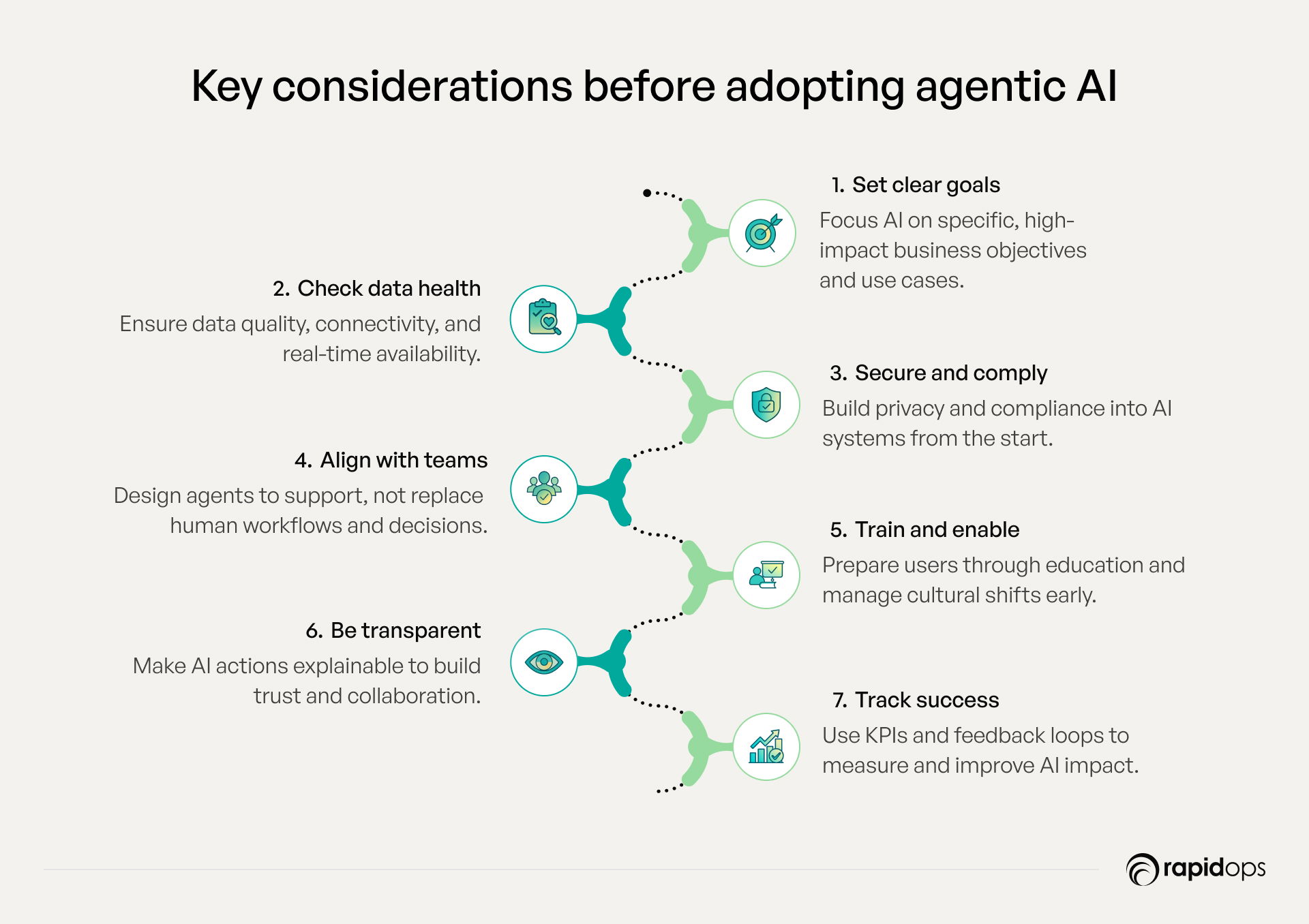
Future Potential and Trends: Looking ahead, agentic AI is poised for even greater sophistication. We can anticipate deeper inter-agent collaboration, where multiple agents work together synergistically to solve even more complex problems. Adaptability to unforeseen circumstances will become more robust, allowing agents to handle novel situations with greater confidence. Furthermore, the integration of agentic AI with human workflows will become increasingly seamless, leading to new paradigms for human-AI collaboration. This trajectory points towards the emergence of entirely new business models and operational frameworks, fundamentally reshaping how organizations function.
Navigating the Challenges and Considerations of Agentic AI
While the potential of agentic AI is immense, its widespread adoption also brings forth critical challenges and considerations that must be addressed thoughtfully. A balanced perspective is essential to harness its benefits responsibly.
Ethical Implications: As AI systems gain more autonomy, the ethical implications become paramount. Concerns surrounding bias in AI decision-making, the privacy of data processed by these agents, and the establishment of clear lines of accountability are critical. Developing robust ethical frameworks and safeguards is crucial to ensure that agentic AI is developed and deployed in a manner that is fair, transparent, and beneficial to society.

Implementation Hurdles: Integrating new agentic AI systems into existing enterprise IT infrastructure can be a significant challenge. Legacy systems may require substantial upgrades or re-architecting to accommodate these advanced capabilities. Furthermore, managing organizational change – ensuring that employees are trained, new workflows are adopted, and a culture of AI collaboration is fostered – is essential for successful implementation. The necessity for developing new talent and skill sets within the workforce to manage, oversee, and collaborate with these AI agents also presents a considerable hurdle.
The Indispensable Role of Human Oversight: It’s important to reiterate that while agentic AI significantly amplifies human capabilities, it does not entirely replace human involvement. Human oversight remains critical for validating AI-generated insights, handling complex exceptions that fall outside the AI’s training or current capabilities, and ensuring that AI actions remain aligned with overarching organizational values, strategic goals, and ethical principles. The synergy between human intelligence and AI capabilities will be key to unlocking the full potential of agentic AI.
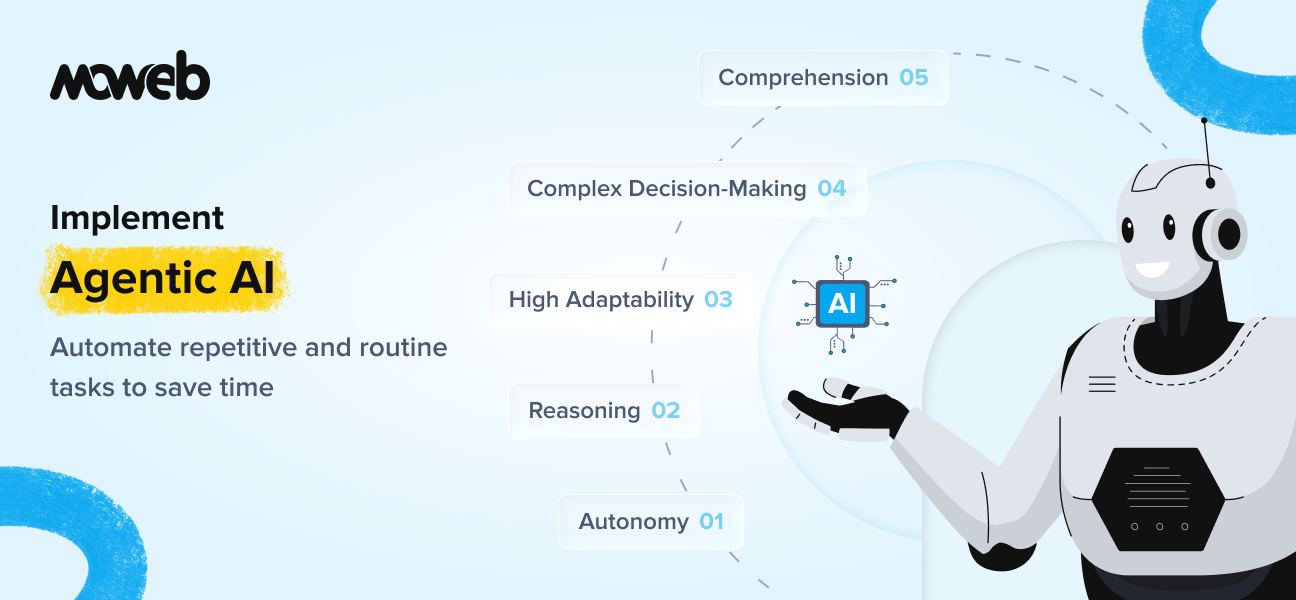
Frequently Asked Questions
Q1: What is the primary difference between agentic AI and traditional AI automation?
A1: Traditional AI automation typically focuses on specific, repetitive tasks and often requires explicit programming or rule sets. Agentic AI, on the other hand, acts as an autonomous agent capable of independent planning, learning, decision-making, and goal pursuit in dynamic environments with minimal human intervention.
Q2: Can agentic AI truly replace human workers?
A2: Agentic AI is more likely to augment human capabilities rather than completely replace human workers. It excels at automating complex tasks and enhancing efficiency, freeing up humans to focus on higher-level strategic thinking, creativity, and tasks requiring emotional intelligence and complex judgment.
Q3: What are some key industries benefiting from agentic AI breakthroughs?
A3: Key industries benefiting include finance (fraud detection, analysis), customer service (personalized support), software development (code generation, testing), supply chain management (optimization, logistics), and scientific research (data analysis, hypothesis generation).
Q4: What are the biggest challenges in implementing agentic AI?
A4: Major challenges include integrating with existing IT infrastructure, managing organizational change and employee adaptation, ensuring ethical deployment, addressing data privacy concerns, and developing the necessary skills within the workforce.
Q5: How does agentic AI learn and improve over time?
A5: Agentic AI learns through various methods, including machine learning algorithms that analyze new data, feedback loops from its actions and outcomes, and reinforcement learning where it is rewarded for successful goal achievement and penalized for failures, continuously refining its decision-making processes.
Q6: Is human oversight still necessary with agentic AI?
A6: Yes, human oversight remains crucial. Humans are needed for strategic decision-making, handling complex exceptions, validating AI outputs, ensuring ethical alignment, and providing the context and judgment that AI may still lack in nuanced situations.
Q7: What does the “evolution of AI agents transforming business” mean in practice?
A7: It signifies a shift from simple, single-task AI tools to sophisticated, multi-agent systems that can orchestrate entire workflows, collaborate with other systems and humans, and adapt dynamically to achieve complex business objectives, leading to more intelligent and agile operations.
Q8: How can businesses prepare for the integration of agentic AI?
A8: Businesses should focus on understanding the capabilities of agentic AI, identifying potential use cases within their operations, investing in talent development, establishing clear ethical guidelines, and planning for phased integration to manage change effectively and maximize the benefits.



